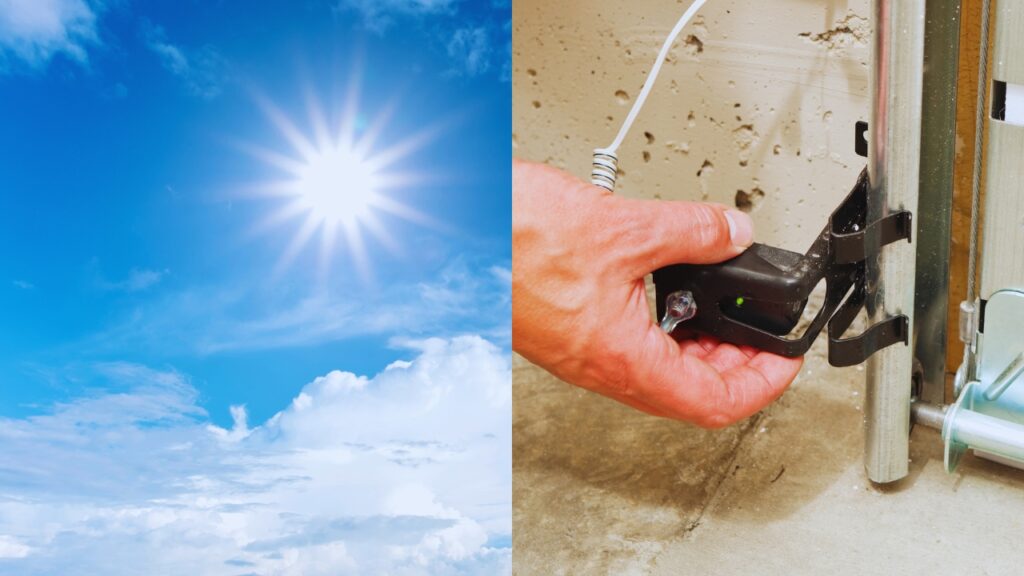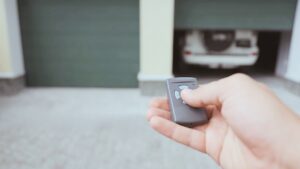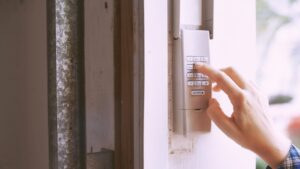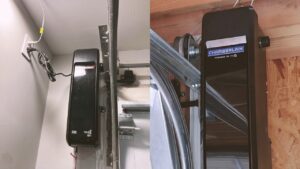Garage door sensors are essential components that ensure the safe and smooth operation of residential garage doors. However, like other garage door components, these sensors are not impervious to malfunction. One common concern is the interference caused by sunlight.
But can sunlight interfere with garage door sensors? Absolutely! Sunlight can interfere with garage door sensors, leading to malfunction or unreliable operation. In this article, we explore the underlying reasons behind sunlight interference.
We also look at how it can affect garage door sensors and provide effective solutions to tackle this challenge head-on.
Can Sunlight Interfere with Garage Door Sensors?
Direct sunlight can interfere with garage door sensors’ signals. When the rays from the sun radiate into the safety sensors, it disrupts their infrared light. This leads to false detections and prevents the sensors from functioning correctly.
A good example is when your garage door faces east or west, direct sunlight streams into the garage during sunrise or sunset and falls directly on the sensors. This creates a glare that prevents the sensors from correctly receiving signals, leaving your garage door’s safety feature dormant.
Connect With A Garage Expert
Connect with local experts, Compare quotes, Get the best price.
Problems Faced by Homeowners When Sunlight Interferes With Garage Door Sensors
Some homeowners may consider bypassing garage door sensors as a short-term fix. However, this approach can introduce additional complications. Here are some of the main problems they can face:

- Security vulnerabilities: When the garage door fails to close properly due to sunlight interference, it exposes the garage and its contents to potential theft or unauthorized access. This can be particularly concerning if valuable items or vehicles are stored in the garage. You may need to take extra precautions to secure your property, leading to added stress and inconvenience.
- Loss of convenience: One of the primary benefits of an automated garage door system is its convenience. Sunlight interference disrupts this convenience since you’ll be required to take additional steps to close the garage door manually. This can be frustrating and impact the overall user experience.
- Safety concerns: If the sunlight overrides the garage door sensors and prevents the door from closing when there are obstructions, it poses a significant safety risk. For example, a person or a child could unknowingly walk into the path of the closing door, leading to potential injuries. Similarly, the door and vehicles may get damaged if objects are left in the doorway since they might not be detected.
- Increased energy consumption: An open garage door allows heat or cold air to enter the garage, affecting your home’s overall energy efficiency. This leads to higher energy bills and unnecessary energy waste since the HVAC system must work harder to compensate for the temperature fluctuations.
Why Is The Sun Not Allowing My Garage Door To Close?
Most residential garage door sensors depend on photo-eye and infrared technology for efficient and effective operation. They consist of a transmitter and receiver placed on opposite sides of the garage door, emitting an infrared beam between them. When an object breaks the beam, it signals the garage door opener to stop or reverse the door’s movement.
That said, the following are the reasons why garage door sensors may be affected by sunlight interference:
The angle of the sensor
Suppose the sensor directly faces the sun, especially during specific times of the day when the sun is low on the horizon. In that case, it increases the likelihood of direct sunlight falling on the sensors. This direct exposure can overpower the sensors’ emitted beam and interfere with their ability to detect objects or obstructions accurately.
Energy from the sunlight
Sunlight, with its intense infrared light, can surpass the sensor’s own emitted beam in strength. When it infiltrates the sensor’s pathway, it can either obstruct the sensor’s beam or generate misleading signals by activating the sensor’s receivers. This overpowering sunlight effectively “blinds” the sensor’s lens, significantly diminishing its operational efficacy by compromising its ability to accurately detect obstacles or changes in the environment.
Heat from sunlight
Sunlight also generates heat that affects the sensors’ performance. This excessive heat causes the sensors to overheat, leading to temporary malfunction or unresponsiveness.
Other components
Materials like reflectors or metal surfaces near the sensors can also reflect sunlight and redirect it toward the sensors, intensifying the interference.
How to Identify Sunlight Interference with Garage Door Sensors
Identifying sunlight interference with garage door sensors is crucial to address potential issues and ensure proper functionality. Here are some of the signs and symptoms to look out for:
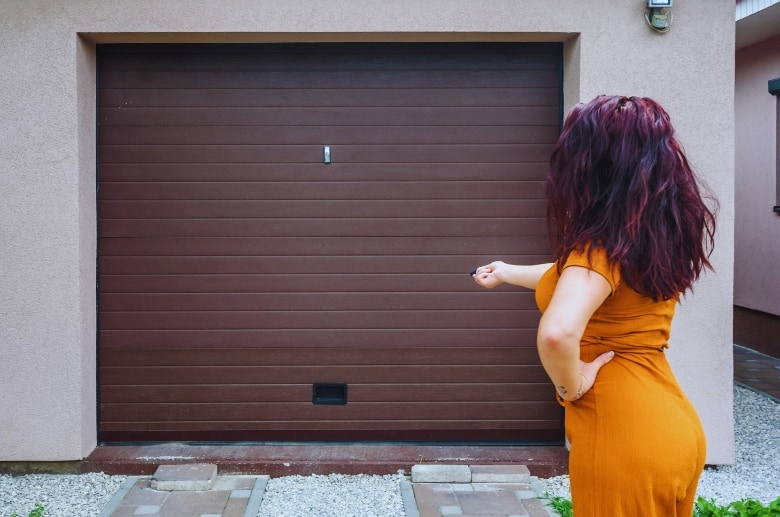
False activations
If your garage door opens or reverses without apparent obstructions, especially when sunlight is intense or directly shines on the sensors, it may indicate sunlight interference.
Inconsistent sensor performance
Do your garage door sensors work fine under normal lighting conditions but experience malfunctions or false detections when exposed to direct sunlight? If so, this is a clear indication of sunlight interference. This is due to the overpowering effect of sunlight, resulting in the unreliable operation of the garage door system.
Delayed or slow response
Sunlight interference can also cause a delay or slow response in the garage door operation. The sensors may struggle to accurately detect the opening or closing commands due to the presence of sunlight, resulting in a noticeable delay in the door’s movement.
Visual observation
Conduct a visual inspection of your garage sensors and their surroundings. If you notice reflective surfaces near the sensors that could amplify or redirect sunlight toward them, it strongly indicates potential sunlight interference.
Connect With A Garage Expert
Connect with local experts, Compare quotes, Get the best price.
How Do I Stop My Garage Door Sensor From Interfering With The Sun?
You can employ various methods to stop your garage door sensor from interfering with the sun. However, DIY approaches and seeking professional assistance are the most common ways. Here is how you can apply both measures:
DIY Solutions
Several DIY solutions allow you to address this issue without professional assistance. They include the following:
1. Adjust the Sensor Position

Reposition the sensors away from direct sunlight to reduce the chances of interference. You can experiment with different angles and heights till you find the optimal position that maximizes their effectiveness and minimizes the impact of sunlight interference. We highly recommend positioning the sensors inside the garage, facing each other, and mounted on the vertical tracks or walls.
2. Create a Shade
You can create a shade for the sensors using simple objects such as cardboard or a toilet paper tube. By placing the shade strategically, you can block the direct sunlight from falling on the sensors, reducing the chances of interference. Here’s a step-by-step guide on how to make a shade using each of these materials:
Using a Cardboard
- Measure the length and width of the sensor lens. Use these measurements to cut a piece of cardboard covering the lens adequately.
- Fold the cardboard piece in half lengthwise to create a V-shape. This shape will help shield the sensor lens from direct sunlight while allowing the emitted beam to pass through.
- Place the folded cardboard shade over the sensor, ensuring it covers the lens completely. Use tape or adhesive to secure the shade in place. Ensure it is firmly attached and does not obstruct the sensor’s operation.
Using a Toilet Paper Tube
- Begin by measuring the length of the sensor lens and cut a section from a toilet paper tube that matches this length.
- Carefully split the toilet paper tube lengthwise to create a semi-circular shape.
- Place the split toilet paper tube over the sensor lens, aligning it to cover the sensors. The split portion will act as a shade, blocking direct sunlight while allowing the sensor to function properly.
- Use tape or adhesive to secure the split tube shade in place, ensuring it remains fixed and does not obstruct the sensor’s operation.
3. Upgrade Your Sensors
Consider upgrading your garage door sensors to models designed to resist sunlight interference. A good example is the Safe-T-Beam® Garage Door Opener Safety Sensors from Genie. This model comes with built-in sunlight filters or advanced features that mitigate the impact of sunlight.
Professional Solutions
Seeking a professional solution is crucial for more complicated cases of sunlight interference with garage door sensors. Garage door technicians have the expertise and experience to assess the specific issue and provide tailored solutions.
Here are the roles of garage door services in resolving sunlight interference:
- Expert Evaluation: Garage door experts evaluate the extent of sunlight interference and its impact on sensor performance. They have the knowledge to identify any underlying issues or weaknesses in the sensor system that may contribute to the interference.
- Offer Customized Solutions: Professionals offer customized solutions based on the specific needs of your garage door system. They may recommend installing specialized sensor shields, filters, or upgraded sensors to effectively resist or mitigate sunlight interference.
- Professional Installation: If new components or adjustments are required, garage door repair services can handle the professional installation. This ensures that the solutions are implemented correctly and do not compromise the safety or functionality of the garage door system.
- Overall System Inspection: Besides addressing sunlight interference, professional technicians comprehensively inspect the garage door system. This ensures that all components, including the sensors, are in optimal condition and functioning correctly.
- Recommending New Products: Professionals are always updated with the latest advancements in the industry and can recommend innovative solutions. A good example is sun shields and sensor shields for garage doors. These products are designed to block or filter sunlight, protecting the sensors from interference and ensuring reliable operation.
How to Install Garage Door Sensor Sun Shield
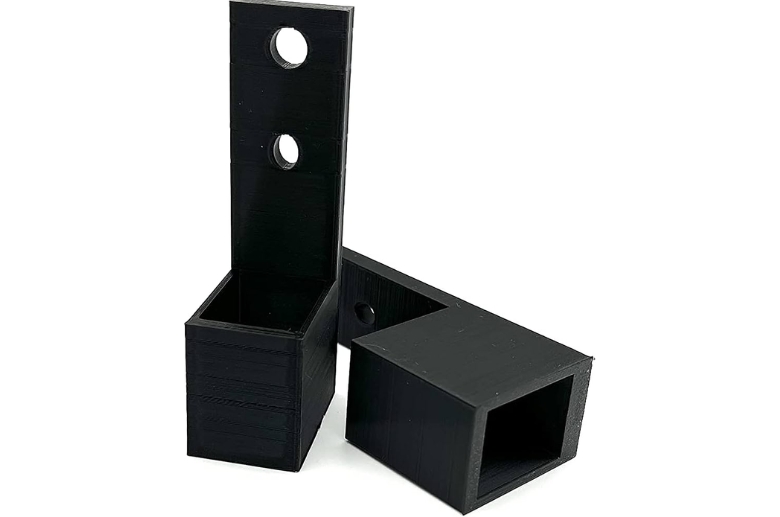
The installation process and effectiveness of sun shields and sensor shields for garage doors vary depending on the specific product and manufacturer. However, here is a general overview:
Step1. Assess the suitability
First things first, it’s all about checking if the sun shield or sensor shield is a good match for your current garage door setup. To get a feel for this, you’ll want to think about the following:
- What kind of sensors you’ve got
- Their position
- Any special needs the product might have
Step 2. Prepare for the installation
Installation involves cleaning the sensor lenses and ensuring they are free from dirt or debris. This step ensures optimal contact and effectiveness of the shields.
Step 3. Mount the shields
Once cleaned, sun or sensor shields are carefully positioned and mounted over the sensor lenses. The installation method can vary, with some products utilizing adhesive backing or clips for secure attachment.
Step 4. Adjust and test the garage door sensor shield
Once you’ve got your shields installed, it’s time for a bit of fine-tuning to make sure everything’s lined up and working as it should.
You will need to test the sensors to verify that the shields reduce sunlight interference without compromising the sensor’s operation. The effectiveness of sun shields and sensor shields in mitigating sunlight interference depends on various factors like the following:
- The design and quality of the product
- Specific angle and intensity of sunlight
- Positioning of the shields.
We recommend you consult a garage door professional for product selection and installation. This will help you maximize the effectiveness of sun and sensor shields in reducing sunlight interference.
Connect With A Garage Expert
Connect with local experts, Compare quotes, Get the best price.
When Is It Time to Replace Your Garage Door Sensors?
There are several situations where opting for the replacement of garage door sensors may be necessary. Here are four common scenarios:
Sensor Damage
Significant damage can impair their functionality and compromise the safety of the garage door system. Replacements may be necessary if the sensors have been physically damaged from accidental impact, extreme weather conditions, or wear and tear.
Sensor Malfunction
When the garage door sensors consistently fail to function properly despite attempts at repair or adjustment, it may indicate a more significant underlying issue. In such cases, replacing the sensors will provide a more reliable solution to ensure the proper operation of the garage door.
Outdated or Incompatible Sensors
Technological advancements in garage door sensors can make outdated models less effective or incompatible with newer systems. Replacing the sensors with newer, compatible models will enhance the overall performance and security of the garage door.
Persistent Sunlight Interference
If sunlight interference continues to be a significant problem despite implementing various mitigation techniques, consider replacing your garage door sensors. Upgrading to sensors designed to resist or mitigate sunlight interference can provide a more reliable and long-term solution.
Garage Door Sensor Repair and Replacement Costs
Garage door sensor repair costs range from $75 – $85. This cost may cover sensor realignment, cleaning, or minor repairs. However, the exact cost will vary depending on various factors like your location, the complexity of the repair, and the service provider.
On the other hand, if you need to replace your sensors, you can expect to pay between $150- $180. This cost includes the purchase of new sensors and the installation process. And like repair, this cost will vary depending on the type and quality of the sensors and additional labor charges for installation.
Conclusion
Garage door sensors may not work properly because of sunlight interference, which can cause safety concerns and disrupt your daily routines. This happens because of the sensor’s angle and the energy and heat from the sunlight.
As explained, you can mitigate this issue with DIY solutions, but you’ll require professional assistance for more complex situations. Professional garage door repair services will provide expert guidance, recommend suitable products, and ensure proper installation.
Ensure you consult a reputable garage door repair service for your sunlight interference and garage door sensor issues.

